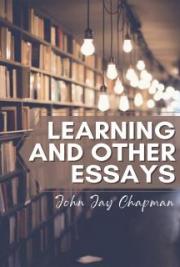Learning and Other Essays
- / Home
- / Academic Articles Books /

Author: John Jay Chapman
Downloads: 81
Visits: 3
Pages: 161
Published: 3 years agoRating: Rated: 0 times Rate It
- 1 star
- 2 stars
- 3 stars
- 4 stars
- 5 stars
Book Description HTML
An expert on Greek Art chanced to describe in my hearing one of the engraved gems in the Metropolitan Museum. He spoke of it as ‘certainly one of the great gems of the world,’ and there was something in his tone that was even more thrilling than his words. He might have been describing the Parthenon or Beethoven’s Mass,—such was the passion of reverence that flowed out of him as he spoke. I went to see the gem afterwards. It was badly placed, and for all artistic purposes was invisible. I suppose that even if I had had a good look at it, I should not have been able to appreciate its full merit. Who could?—save the handful of adepts in the world, the little group of gem-readers, by whom the mighty music of this tiny score could be read at sight. Nevertheless it was a satisfaction to me to have seen the stone. I knew that through its surface there poured the power of the Greek world; that not without Phidias and Aristotle...
